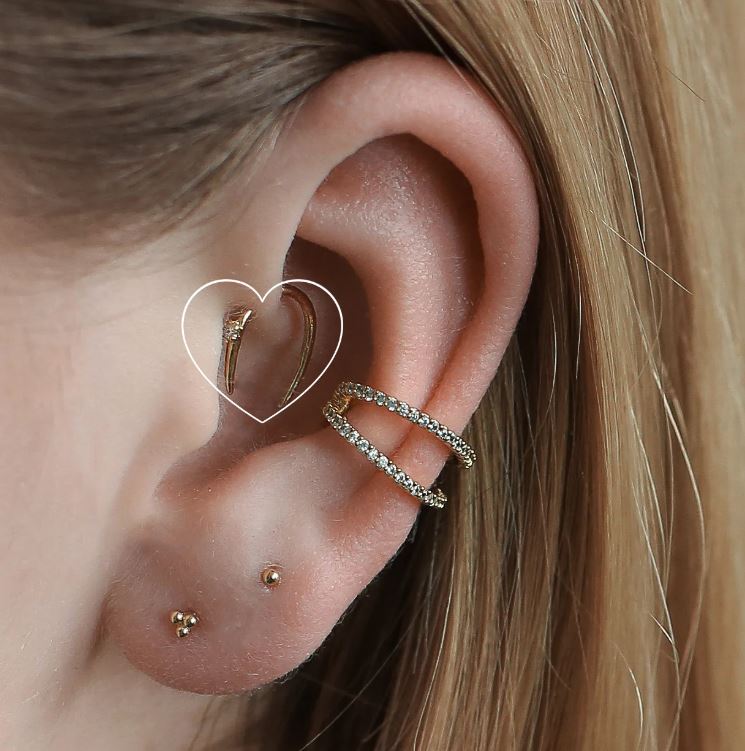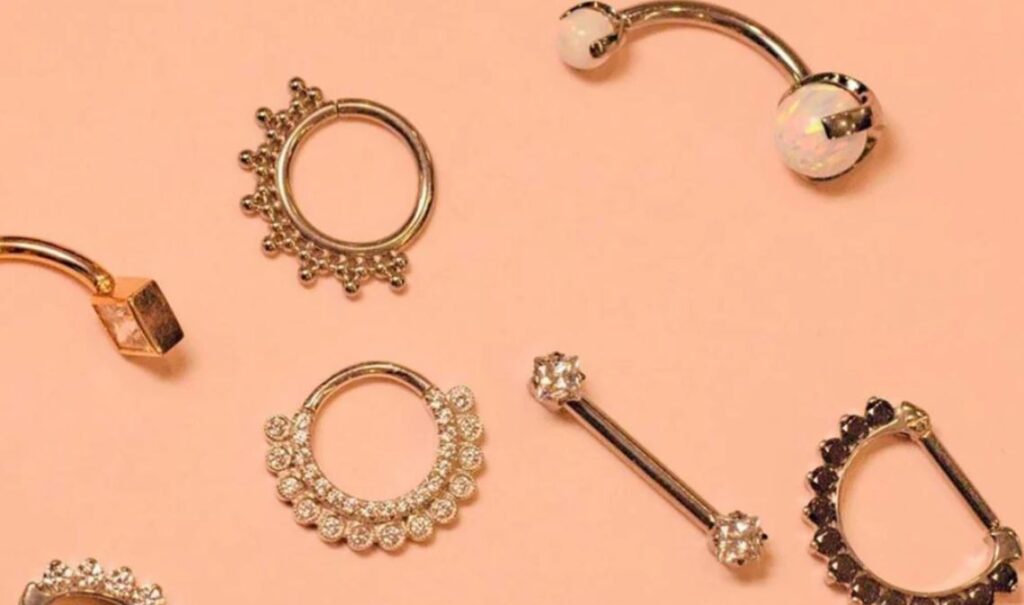Is Titanium Good for Piercings
Yes, titanium is excellent choice for piercings. It is lightweight, bio compatible and skin friendly. It does not corrode or tarnish. Piercing experts often recommend titanium as foremost choice of metal for both fresh and regular piercings. All of these properties make titanium best for piercings.
In this article we’ll discuss is titanium good for piercings, what makes it hypoallergenic and should you use it.
What Makes Titanium a Better Choice?
Here is a list of reasons what make titanium a better choice.
1. Hypoallergenic
The foremost reason of titanium being completely safe for piercings is its hypoallergenic properties. In simple words, it is a nickel-free metal. In case you don’t know, nickel is the root cause of many skin allergies associated with jewelry. People with sensitive skin often find themselves in a lot of trouble with metals containing nickel. It is commonly found in stainless steel and some silver alloys.
Allergic reactions to jewelry can range from mild redness or itching to more severe issues such as inflammation and infection. Since titanium is not only hypoallergenic but also biocompatible, it reduces the likelihood of developing these issues, making it especially suitable for new piercings, where healing is critical. Because of these qualities, many piercers recommend titanium jewelry for initial piercings.

2. Lightweight
Titanium is an incredibly lightweight metal which omits all the chances of jewelry being felt heavier. If you are one thinking about getting rid of metals which feel heavier and itchy on new piercings, titanium is the best choice for you. At the same time, it is also super strong to bear all the external damages like scratches, dents etc. This property makes it an incredible choice for piercing specifically for first time piercers.
3. Bio-Compatible
Another benefit associated with titanium is its bio-compatibility. So what the heck is this? Actually human body has this property in which it rejects any foreign object that it recognizes as a danger. It can be anything from food to metals. Allergies are also a result of this.
Titanium is a fully bio-compatible metal meaning that your body will never take it as a danger and will never lead to allergic reactions.
Titanium is also proven to have anti-microbial properties. Germs simply cant grow on it. It actually slows down the speed of germs’ growth which can decrease the chances of getting any kind of infections.
4. Non-Corrosive and Non-Tarnishing
Titanium’s natural resistance to corrosion and tarnish is one of its most significant advantages, especially for people who wear jewelry constantly or participate in activities that involve exposure to water, sweat, or other elements. Other metals, such as stainless steel, may corrode over time when exposed to saltwater, chlorine, or even the moisture from sweat.
Titanium, however, forms a protective oxide layer on its surface when exposed to air, which prevents the metal from rusting or tarnishing.
5. Durable
Titanium is incredibly durable and strong. It is known for its high tensile strength, which allows it to resist bending, breaking, or losing shape over time. This means titanium jewelry can withstand significant wear and tear without being damaged, making it an excellent investment for those looking for jewelry that will last a lifetime.
Unlike gold, which is a soft metal that can scratch and bend, titanium is much more resistant to scratches and dents. This makes it ideal for individuals who want jewelry that will maintain its appearance even with daily wear and tear.

Titanium vs Other Metals for Piercing
When it comes to body jewelry, there are several materials you can choose from, each with its own set of advantages and drawbacks. Here’s how titanium compares to other popular materials used in piercings:
Titanium vs Stainless Steel
Stainless steel is a popular and affordable option for body piercings, but it can be more prone to tarnishing or corrosion, especially when exposed to water or sweat. Titanium, on the other hand, is much more resistant to corrosion and is ideal for long-term wear. Additionally, titanium is lighter and hypoallergenic, making it a better choice for individuals with sensitive skin or allergies.
Titanium vs Gold
Gold is a popular choice for piercings, particularly for those seeking a luxurious look. However, gold is softer than titanium, making it more prone to scratches and deformation. It also tends to tarnish over time, especially if it’s not made from high-purity gold (like 24k or 18k). Gold jewelry is often alloyed with other metals, which may cause irritation or allergic reactions.
Titanium vs Niobium
Niobium is another metal that is often used for body piercings. Like titanium, it is biocompatible, corrosion-resistant, and hypoallergenic. Niobium is heavier than titanium but can also be anodized to produce vibrant colors. Niobium is slightly more malleable than titanium, which may make it more prone to bending under pressure.
Drawbacks of Titanium for Piercings
While titanium is widely regarded as one of the best metals for body jewelry, it is important to consider the potential downsides before making your decision.
1. Cost
Titanium tends to be more expensive than other metals commonly used for piercings, such as stainless steel. While stainless steel is affordable and still offers a great level of durability, titanium’s unique properties such as its lightweight nature, corrosion resistance, and hypoallergenic qualities make it a more premium option.
For those on a budget or looking for inexpensive jewelry for temporary wear, titanium may not be the most cost-effective option. However, many people find that the benefits outweigh the higher initial price, as titanium jewelry tends to last longer and requires less maintenance compared to other metals.
2. Limited Design Options
Titanium is more difficult to shape and mold than other metals like gold or silver. This means that jewelry designs made from titanium may be less intricate or detailed than those made from softer metals. While there are plenty of beautiful, sleek designs available in titanium, the range of highly decorative or customizable designs may be more limited than that of other materials.
However, as titanium jewelry continues to grow in popularity, many jewelry makers are finding ways to create more detailed and artistic designs using titanium. The limitations on design are becoming less significant as manufacturing techniques improve.
3. Difficult to Resize
Titanium is harder than gold and silver. It makes titanium a very difficult metal to resize. Proper tools like hammer is required for any bending, resizing or customization. This makes it less ideal for people who want frequent resizing.
Common FAQ’s about Titanium Piercing
Here are some questions about titanium piercing.
1. How much cost does titanium piercing take?
It depends on the type of piercing you have. It starts at about $50 per piercing.
2. Does Titanium come with Nickel?
No, titanium does not have nickel.
3. What is a good alternative to Titanium for Piercing?
Niobium can be a good alternative. It is more lightweight than titanium and offer hypoallergenic properties.
Conclusion
Titanium is an excellent material for body piercings due to its numerous benefits, including its hypoallergenic properties, strength, corrosion resistance, lightweight nature, and non-reactivity with body fluids. These qualities make titanium one of the safest and most durable options available for piercings. Although it may be more expensive than other metals, the longevity, comfort, and low risk of irritation or allergic reaction make it a wise investment for both new and seasoned piercing enthusiasts.

